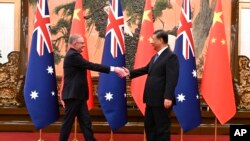The leaders of Australia and China on Monday welcomed the improvement in relations between their countries in the past year and emphasized the importance of engaging with each other despite differences on issues such as defense.
Prime Minister Anthony Albanese is making the first visit by an Australian leader to China in seven years in a sign of both how low relations fell and how they have begun to stabilize.
China, a major market for Australia, has lifted some trade restrictions on Australian products since Albanese's first meeting with Chinese leader Xi Jinping in Bali, Indonesia, in November 2022.
"The progress we have made in advancing our relationship over that time has been unquestionably very positive," Albanese said in opening remarks to Xi before the media. "Trade is flowing more freely to the benefit of both countries."
Xi said that both sides had resumed exchanges of views and worked out some problems.
"The China-Australia relationship has embarked on the right path of improvement and development," Xi said. "I'm heartened to see that."
Relations nosedived in recent years as suspicions of Chinese interference in Australian politics increased. China, in turn, was angered by Australia's call for an inquiry into the origins of the COVID-19 virus.
China levied tariffs and unofficial trade barriers that are estimated to have cost Australian exporters up to 20 billion Australian dollars ($13 billion) a year for products such as coal, wine, beef, barley and lobsters.
Those barriers have since been substantially reduced and now cost about $2 billion Australian dollars ($1.3 billion).
Further, Australian journalist Cheng Lei was released last month after three years in detention in China under charges of espionage in a case that had come to be a focal point in the tensions.
Even as Albanese has largely sounded upbeat during his visit, Australia is still actively pursuing a security partnership with the United Kingdom and the United States that China views as an attempt to counter its influence in the region.
The Australian leader, in his opening remarks to Xi, underscored the importance of high-level dialogue and people-to-people links.
"Where differences arise, it's important that we have communication," Albanese said. "From communication comes understanding."
Before coming to Beijing, Albanese was a guest at the opening ceremony of an annual import expo in Shanghai on Sunday at which Chinese Premier Li Qiang pledged to further relax market access.
Albanese's visit comes near the 50th anniversary of the first trip by an Australian prime minister to the People's Republic of China.
"Your visit this time is highly significant, as it builds on the past and ushers in the future," Xi told Albanese.
Albanese noted the 1973 visit of former Prime Minister Gough Whitlam in a post on X, formerly Twitter, that included photos of the current leader and his entourage visiting the Temple of Heaven historic site.
"Since he visited the Temple of Heaven in Beijing, much has changed," Albanese wrote. "But what is constant is that engagement between our two countries remains important."




